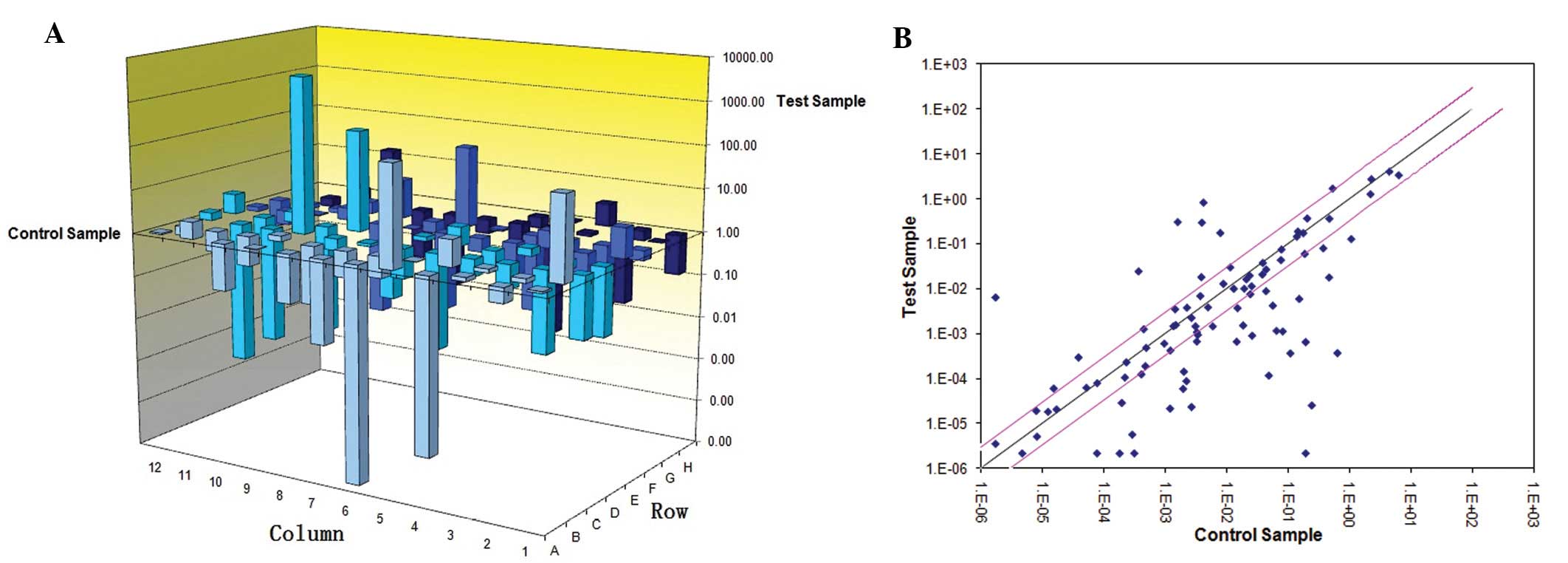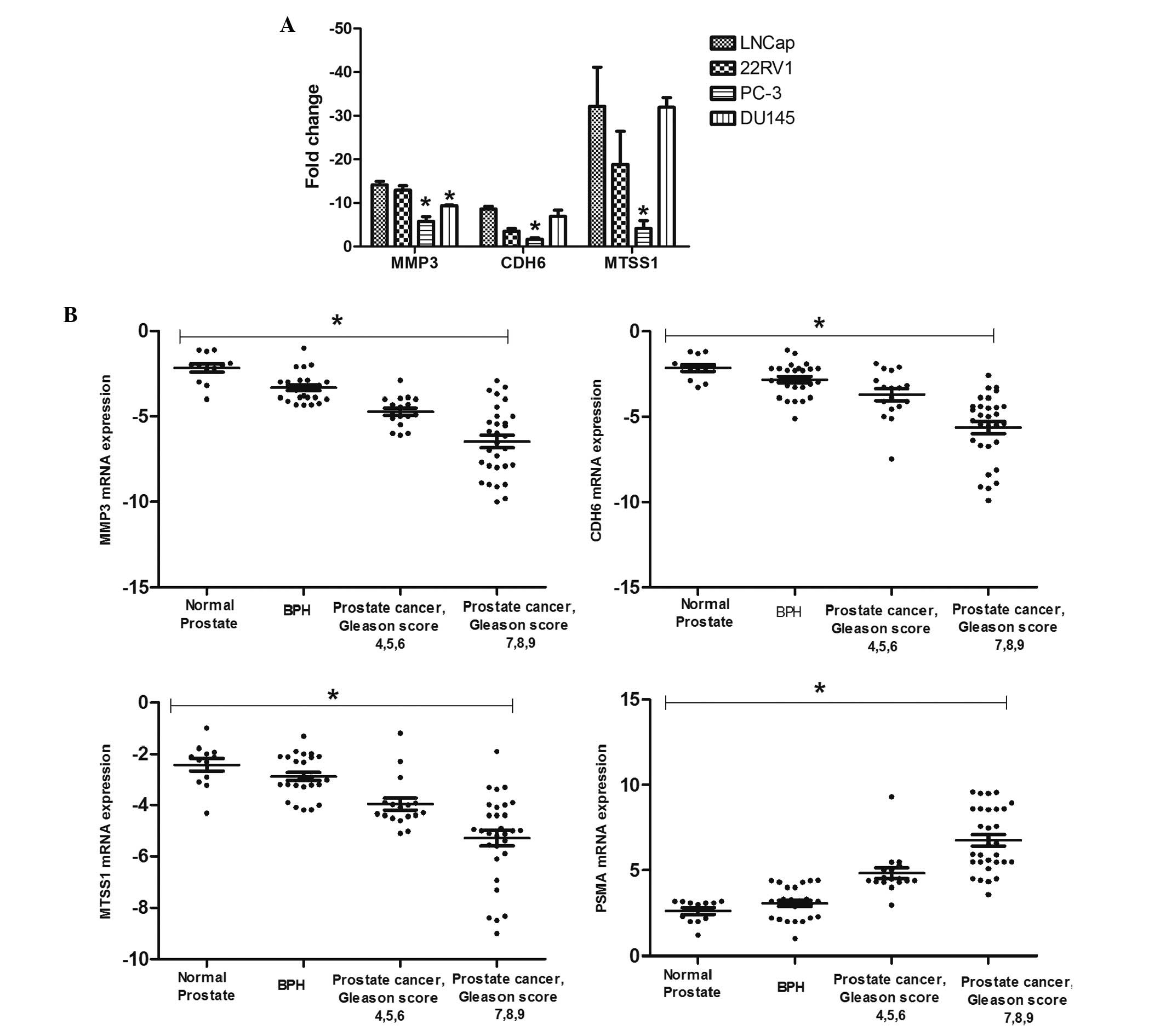|
1
|
Chang SS: Overview of prostate-specific
membrane antigen. Rev Urol. 6(Suppl 10): S13–S18. 2004.PubMed/NCBI
|
|
2
|
Kypta R, Unda M and Carracedo A: Is the
bench getting closer to the bedside in the war on cancer? A quick
look at prostate cancer. Front Endocrinol. 3:532012. View Article : Google Scholar : PubMed/NCBI
|
|
3
|
Nelson WG, De Marzo AM and Isaacs WB:
Prostate cancer. N Engl J Med. 349:366–381. 2003. View Article : Google Scholar
|
|
4
|
Paller CJ, Carducci MA and Philips GK:
Management of bone metastases in refractory prostate cancer - role
of denosumab. Clin Interv Aging. 7:363–372. 2012. View Article : Google Scholar : PubMed/NCBI
|
|
5
|
Jemal A, Tiwari RC, Murray T, Ghafoor A,
Samuels A, Ward E, Feuer EJ and Thun MJ: Cancer statistics. CA
Cancer J Clin. 54:8–29. 2004.
|
|
6
|
Germain A, Richardson R, Moul DE, Mammen
O, Haas G, Forman SD, Rode N, Begley A and Nofzinger EA:
Placebo-controlled comparison of prazosin and cognitive-behavioral
treatments for sleep disturbances in US Military Veterans. J
Psychosom Res. 72:89–96. 2012. View Article : Google Scholar : PubMed/NCBI
|
|
7
|
Schroder FH: Progress in understanding
androgen-independent prostate cancer (AIPC): a review of potential
endocrine-mediated mechanisms. Eur Urol. 53:1129–1137. 2008.
View Article : Google Scholar
|
|
8
|
Kasper S and Cookson MS: Mechanisms
leading to the development of hormone-resistant prostate cancer.
Urol Clin North Am. 33:201–210. vii2006. View Article : Google Scholar : PubMed/NCBI
|
|
9
|
Pinto JT, Suffoletto BP, Berzin TM, Qiao
CH, Lin S, Tong WP, May F, Mukherjee B and Heston WD:
Prostate-specific membrane antigen: a novel folate hydrolase in
human prostatic carcinoma cells. Clin Cancer Res. 2:1445–1451.
1996.PubMed/NCBI
|
|
10
|
Robinson MB, Blakely RD, Couto R and Coyle
JT: Hydrolysis of the brain dipeptide
N-acetyl-L-aspartyl-L-glutamate. Identification and
characterization of a novel N-acetylated alpha-linked acidic
dipeptidase activity from rat brain. J Biol Chem. 262:14498–14506.
1987.PubMed/NCBI
|
|
11
|
Cao KY, Mao XP, Wang DH, Xu L, Yuan GQ,
Dai SQ, Zheng BJ and Qiu SP: High expression of PSM-E correlated
with tumor grade in prostate cancer: a new alternatively spliced
variant of prostate-specific membrane antigen. Prostate.
67:1791–1800. 2007. View Article : Google Scholar : PubMed/NCBI
|
|
12
|
Cao KY, Xu L, Zhang DM, Zhang XM, Zhang T,
He X, Wang Z, Feng FS, Qiu SP and Shen GX: New alternatively
spliced variant of prostate-specific membrane antigen PSM-E
suppresses the proliferation, migration and invasiveness of
prostate cancer cells. Int J Oncol. 40:1977–1985. 2012.PubMed/NCBI
|
|
13
|
Ghosh A and Heston WD: Tumor target
prostate specific membrane antigen (PSMA) and its regulation in
prostate cancer. J Cell Biochem. 91:528–539. 2004. View Article : Google Scholar
|
|
14
|
Frigerio B, Fracasso G, Luison E,
Cingarlini S, Mortarino M, Coliva A, Seregni E, Bombardieri E,
Zuccolotto G, Rosato A, Colombatti M, Canevari S and Figini M: A
single-chain fragment against prostate specific membrane antigen as
a tool to build theranostic reagents for prostate cancer. Eur J
Cancer. pii: S0959-8049(13)00087-7. View Article : Google Scholar : 2013. View Article : Google Scholar
|
|
15
|
Zhao LY, Mao XP, Chao KY, Guo SJ and Qiu
SP: Prostate-specific membrane antigen can promote in vivo osseous
metastasis of prostate cancer cells in mice. Braz J Med Biol Res.
45:737–745. 2012. View Article : Google Scholar : PubMed/NCBI
|
|
16
|
Mannweiler S, Amersdorfer P, Trajanoski S,
Terrett JA, King D and Mehes G: Heterogeneity of prostate-specific
membrane antigen (PSMA) expression in prostate carcinoma with
distant metastasis. Pathol Oncol Res. 15:167–172. 2009. View Article : Google Scholar : PubMed/NCBI
|
|
17
|
Ghosh A, Wang X, Klein E and Heston WD:
Novel role of prostate-specific membrane antigen in suppressing
prostate cancer invasiveness. Cancer Res. 65:727–731.
2005.PubMed/NCBI
|
|
18
|
Xie BX, Zhang H, Wang J, Pang B, Wu RQ,
Qian XL, Yu L, Li SH, Shi QG, Huang CF and Zhou JG: Analysis of
differentially expressed genes in LNCaP prostate cancer progression
model. J Androl. 32:170–182. 2010.PubMed/NCBI
|
|
19
|
Wang G, Firoz EF, Rose A, Blochin E,
Christos P, Pollens D, Mazumdar M, Gerald W, Oddoux C, Lee P and
Osman I: MDM2 expression and regulation in prostate cancer racial
disparity. Int J Clin Exp Pathol. 2:353–360. 2009.PubMed/NCBI
|
|
20
|
Kohn EC: Invasion and metastasis: biology
and clinical potential. Pharmacol Ther. 52:235–244. 1991.
View Article : Google Scholar : PubMed/NCBI
|
|
21
|
Duffy MJ, McGowan PM and Gallagher WM:
Cancer invasion and metastasis: changing views. J Pathol.
214:283–293. 2008. View Article : Google Scholar : PubMed/NCBI
|
|
22
|
Kong L, Yuan Q, Zhu H, Li Y, Guo Q, Wang
Q, Bi X and Gao X: The suppression of prostate LNCaP cancer cells
growth by Selenium nanoparticles through Akt/Mdm2/AR controlled
apoptosis. Biomaterials. 32:6515–6522. 2011. View Article : Google Scholar : PubMed/NCBI
|
|
23
|
Roomi MW, Monterrey JC, Kalinovsky T, Rath
M and Niedzwiecki A: Inhibition of invasion and MMPs by a nutrient
mixture in human cancer cell lines: a correlation study. Exp Oncol.
32:243–248. 2011.PubMed/NCBI
|
|
24
|
Loberg RD, Neeley CK, Adam-Day LL, Fridman
Y, St John LN, Nixdorf S, Jackson P, Kalikin LM and Pienta KJ:
Differential expression analysis of MIM (MTSS1) splice variants and
a functional role of MIM in prostate cancer cell biology. Int J
Oncol. 26:1699–1705. 2005.PubMed/NCBI
|
|
25
|
Inoue T, Inoue YU, Asami J, Izumi H,
Nakamura S and Krumlauf R: Analysis of mouse Cdh6 gene regulation
by transgenesis of modified bacterial artificial chromosomes. Dev
Biol. 315:506–520. 2008. View Article : Google Scholar : PubMed/NCBI
|
|
26
|
Mendes O, Kim HT and Stoica G: Expression
of MMP2, MMP9 and MMP3 in breast cancer brain metastasis in a rat
model. Clin Exp Metastasis. 22:237–246. 2005. View Article : Google Scholar : PubMed/NCBI
|
|
27
|
Chang HJ, Yang MJ, Yang YH, Hou MF, Hsueh
EJ and Lin SR: MMP13 is potentially a new tumor marker for breast
cancer diagnosis. Oncol Rep. 22:1119–1127. 2009.PubMed/NCBI
|
|
28
|
Wang W, Wu W, Desai T, Ward DC and Kaufman
SJ: Localization of the alpha 7 integrin gene (ITGA7) on human
chromosome 12q13: clustering of integrin and Hox genes implies
parallel evolution of these gene families. Genomics. 26:568–570.
1995. View Article : Google Scholar : PubMed/NCBI
|
|
29
|
Samson T, Smyth N, Janetzky S, Wendler O,
Müller JM, Schüle R, von der Mark H, von der Mark K and Wixler V:
The LIM-only proteins FHL2 and FHL3 interact
with α- and β-subunits of the muscle α7β1
integrin receptor. J Biol Chem. 279:28641–28652. 2004.PubMed/NCBI
|
|
30
|
Zhu ZH, Yu YP, Zheng ZL, Song Y, Xiang GS,
Nelson J, Michalopoulos G and Luo JH: Integrin alpha 7 interacts
with high temperature requirement A2 (HtrA2) to induce prostate
cancer cell death. Am J Pathol. 177:1176–1186. 2010. View Article : Google Scholar : PubMed/NCBI
|
|
31
|
Mazzoccoli G, Sothern RB, Pazienza V,
Piepoli A, Muscarella LA, Giuliani F and Tarquini R: Circadian
aspects of growth hormone-insulin-like growth factor axis function
in patients with lung cancer. Clin Lung Cancer. 13:68–74. 2011.
View Article : Google Scholar : PubMed/NCBI
|
|
32
|
Montagnani Marelli M, Moretti RM, Procacci
P, Motta M and Limonta P: Insulin-like growth factor-I promotes
migration in human androgen-independent prostate cancer cells via
the αvβ3 integrin and PI3-K/Akt signaling.
Int J Oncol. 28:723–730. 2006.PubMed/NCBI
|
|
33
|
Nickerson T, Chang F, Lorimer D, Smeekens
SP, Sawyers CL and Pollak M: In vivo progression of LAPC-9 and
LNCaP prostate cancer models to androgen independence is associated
with increased expression of insulin-like growth factor I (IGF-I)
and IGF-I receptor (IGF-IR). Cancer Res. 61:6276–6280.
2001.PubMed/NCBI
|
|
34
|
Uygur B and Wu WS: SLUG promotes prostate
cancer cell migration and invasion via CXCR4/CXCL12 axis. Mol
Cancer. 10:1392011. View Article : Google Scholar : PubMed/NCBI
|

















